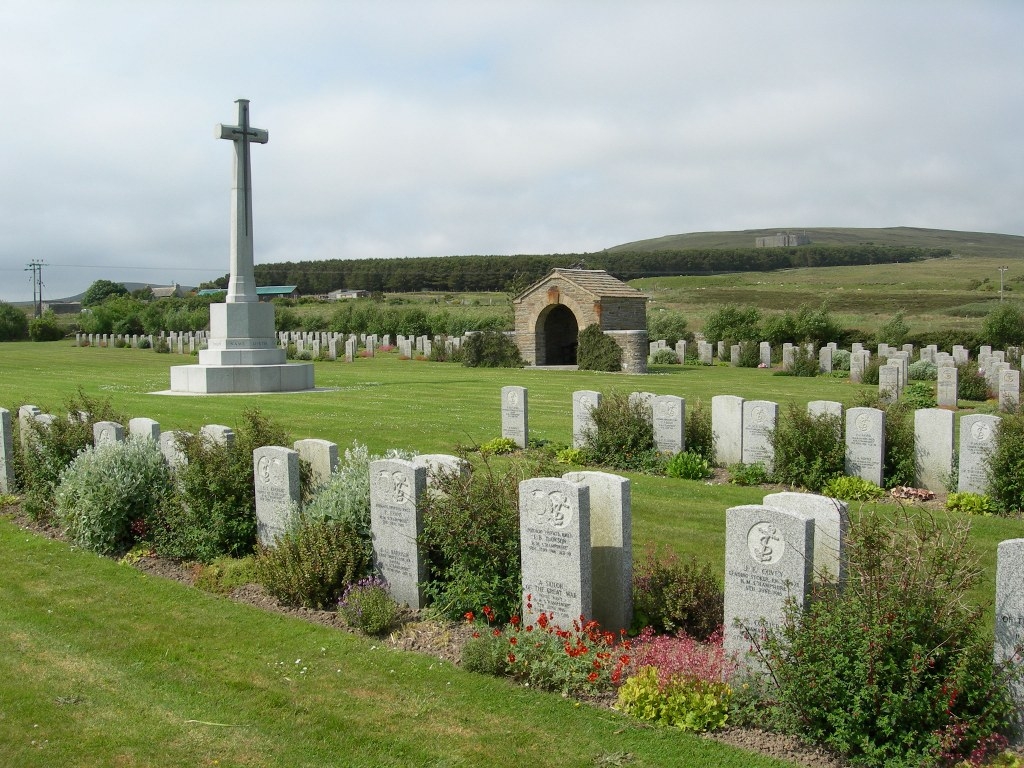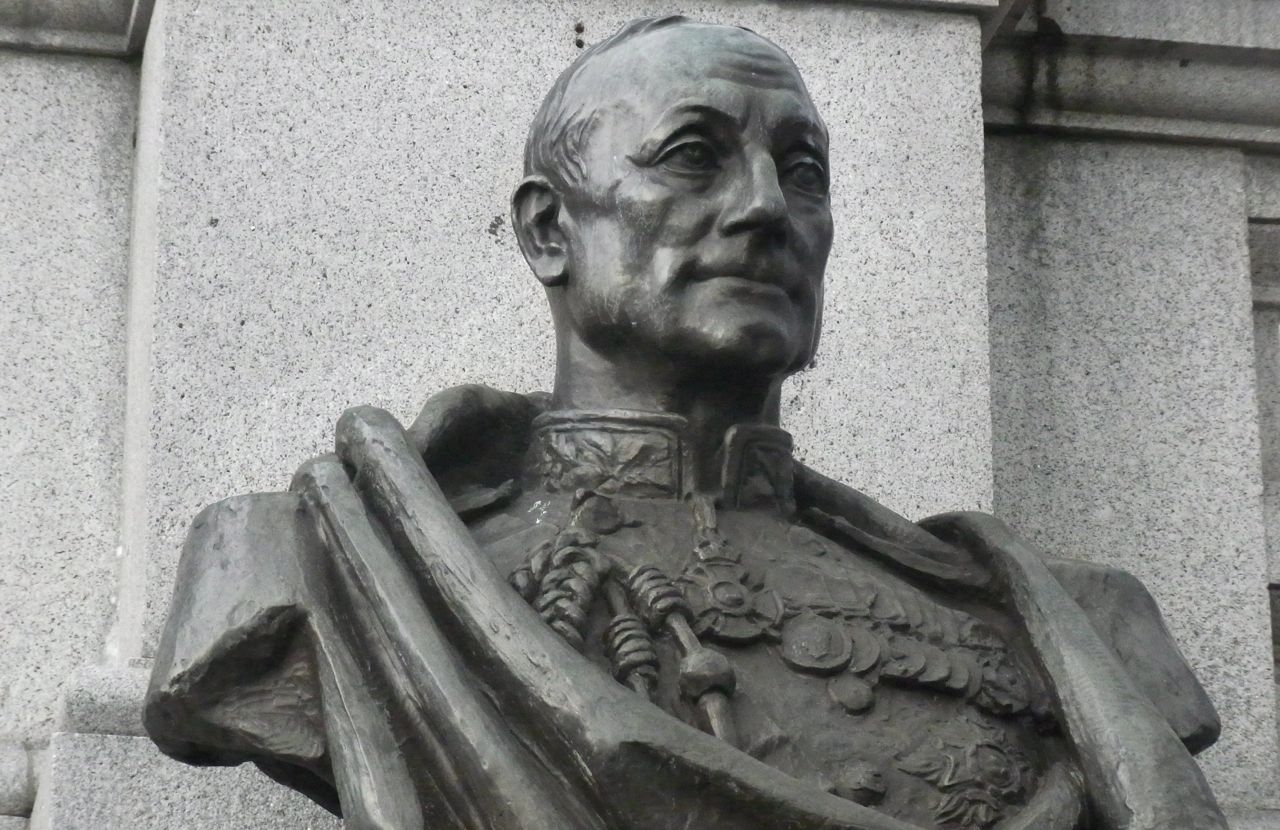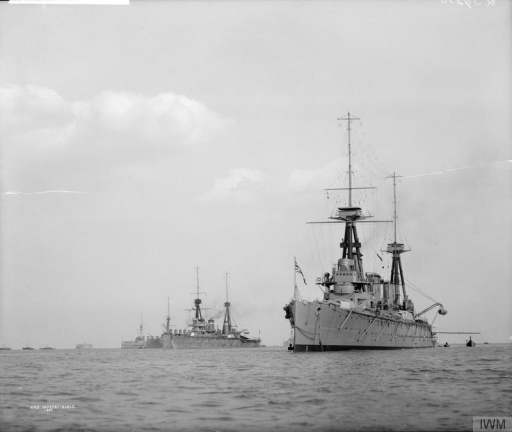British and German ships are to lay wreaths in the North Sea as part the UK’s plans to mark the centenary of the Battle of Jutland on May 31st 2016.
The Orkney Islands will also host a series of events remembering the biggest naval battle of the First World War between the Royal Navy’s Grand Fleet and the German High Seas Fleet.
Ceremonies include a service at St Magnus Cathedral in Kirkwall and commemorations at the Royal Navy Cemetery at Lyness, on the island of Hoy.
Additional information about how descendants can attend will be announced at the end of the year.
More than 6,000 British sailors and 2,500 German crewmen lost their lives at the Battle of Jutland, fought off the coast of Denmark, on May 31st/June 1st 1916.
The Grand Fleet sailed into action from its base at Scapa Flow, a vast natural harbour in the heart of the Orkney Islands.
 Lyness Royal Naval Cemetery, overlooking Scapa Flow, will be among Orkney commemorative venues (Photo © CWGC)
Lyness Royal Naval Cemetery, overlooking Scapa Flow, will be among Orkney commemorative venues (Photo © CWGC)
Announcing the Centenary plans, UK Culture Secretary John Whittingdale said: “These commemorations will be an opportunity for the country to come together to honour those who lost their lives during the Battle of Jutland.
“The pivotal role that the Royal Navy played in the war effort cannot be underestimated and we owe a great to debt to those brave souls who gave their lives.
“But behind the scenes of conflict there are also the contribution of Scotland and the people of Orkney who supported the war effort – we must remember their sacrifice too and ensure their stories are told for generations to come.”
Summary of Jutland Centenary events
More than 100,000 sailors and 250 warships from both sides were involved in the Battle of Jutland
A major clash at sea had been long expected but in the event, it was the only full-scale encounter between British and German battleships during the First World War.
Although British losses of men and ships were greater, the German surface fleet didn’t mount another major challenge for the rest of the conflict.
The Royal Navy enforced a maritime blockade throughout 1914-18 to stop supplies reaching German ports. Germany responded with campaigns of unrestricted submarine warfare in 1915, and again in 1917.
Lifeline
Admiral Sir George Zambellas, present-day head of the Royal Navy, said: “The First World War remains characterised by imagery of the trenches of the Western Front. Yet the sea was Britain’s lifeline and the supremacy of the Royal Navy was crucial to national survival.
“It is right, a century after Jutland – the largest and last clash between Dreadnoughts, that we join together to remember those lost from both sides.”
The anniversary will also be used as an opportunity to reflect on the impact of the First World War on Orkney, and the islands’ role in playing host to the Grand Fleet throughout the conflict.
Councillor Jim Foubister, Vice Convener of Orkney Islands Council, said: “It is fitting that Orkney will host the national commemoration and that this will draw to a close at Lyness among the graves of some of the many thousands of sailors who lost their lives at Jutland.
“Over the months ahead, children in our schools will look at many aspects of the war, at Orkney’s role and the contributions of our forbearers. In this way we can help ensure that those who paid the ultimate sacrifice for their countries are never forgotten.”
 Admiral Sir John Jellicoe’s bust in Trafalgar Square, London (Photo: Centenary News)
Admiral Sir John Jellicoe’s bust in Trafalgar Square, London (Photo: Centenary News)
The Jutland Centenary will have special significance for descendants of those who served, among them Nick Jellicoe, grandson of the commander of the Grand Fleet, Admiral Sir John Jellicoe. He’s been exploring the battle for a forthcoming book.
“Jutland has been an exciting & rewarding journey of discovery through which I’ve come to deeply admire a man I never personally knew: my grandfather, ” Nick Jellicoe commented.
“Listening to other peoples’ memories – from my extended family or complete strangers – has brought him to life for me. I only wish that I’d asked the one person who knew him better than anyone: my own dad. Those are memories I would have cherished.”
Also in Centenary News:
Royal Navy captures 3D images of Battle of Jutland wrecks.
Jutland ensigns to feature at National Museum of the Royal Navy centenary exhibition in Portsmouth.
UK’s National Maritime Museum announces Jutland Centenary exhibition at Greenwich.
HMS Caroline receives £11.5 million restoration grant.
Source: UK Government (Department for Culture, Media & Sport)
Images courtesy of Imperial War Museums © IWM Q 39216 (HMS Indefatigable); Commonwealth War Graves Commission (Lyness Royal Naval Cemetery); Centenary News (Sir John Jellicoe)
Posted by: Peter Alhadeff, Centenary News
